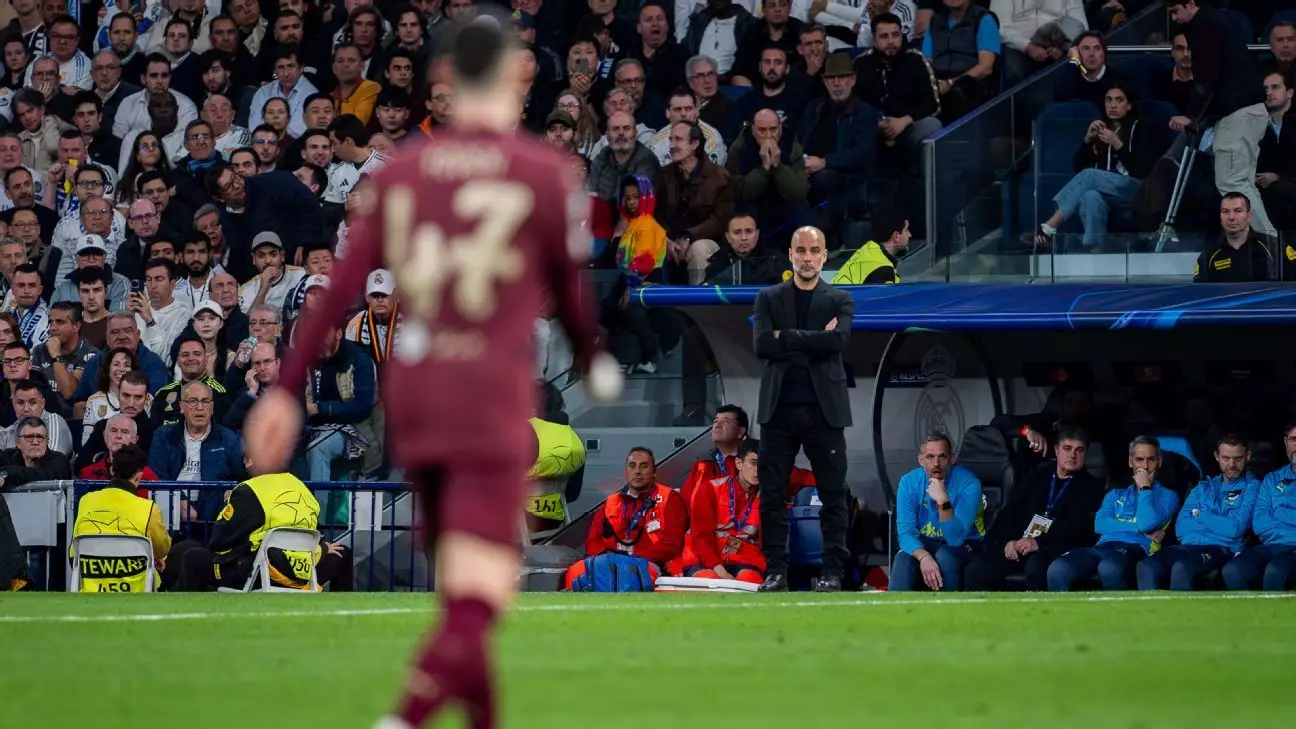The recent exit of Manchester City from the Champions League, following a decisive defeat to Real Madrid, has been a bitter pill to swallow for the Premier League champions. Pep Guardiola, a manager with an illustrious record in European competition, has now faced a unique challenge: ensuring his team qualifies for next season’s Champions League. The 6-3 aggregate loss to Madrid highlights the shifting dynamics in football, raising questions about City’s recent form and their aspirations moving forward.
The match itself was marred by Kylian Mbappé’s exceptional performance, who notched a hat trick that ultimately sealed City’s fate. This elimination marks a significant moment for Guardiola, as it is the first time in his storied coaching career that he has not progressed to the knockout stage of the tournament. The implication of this defeat extends beyond a single match; it signifies a potential reevaluation of City’s strategy and performance in European competitions.
Reality Check for Guardiola’s Side
In the aftermath of the loss, Guardiola acknowledged the superiority of Real Madrid, stating, “The best team won, they deserve it.” Such humility is emblematic of Guardiola’s approach, yet it also underscores the reality that City must confront. This season has not been devoid of challenges, and Guardiola’s reflection on recent performances reveals a deeper concern regarding the team’s consistency and resilience in high-pressure situations.
City’s defense, particularly against an attack led by Mbappé, has proven insufficient. Guardiola’s admission that “we couldn’t defend well with the movement from Mbappé” accentuates a systemic issue within the squad. This vulnerability could have lasting repercussions as they now pivot their focus toward the Premier League, where securing a top four finish has become paramount.
With 13 Premier League matches remaining, City’s goal is clear: to secure a spot among England’s elite, enabling their return to European competition next season. The team currently finds itself 17 points adrift of league leaders Liverpool, prompting an urgent need for reflection and improvement. Guardiola’s acknowledgment that “nothing is eternal” serves as a reminder of the transient nature of success in football. The title that seemed within reach now feels significantly more challenging.
As City gears up for a confrontation with Liverpool, the stakes are raised. This clash will not only test the mettle of the team in the domestic league but will also serve as a precursor to their potential performance in the future. Star striker Erling Haaland’s absence due to injury complicates matters further, yet Guardiola must galvanize his squad to rise to the occasion despite these adversities.
Lessons from Experience
Giants of football often experience up and down seasons, and the current turbulence at City is a crucial learning opportunity. Guardiola’s remarks regarding previous seasons of success underscore a critical aspect of professional sports: adaptation. Acknowledging that “in previous seasons when we were playing outstanding, it hurts more than today” reveals an acceptance of the fluctuating nature of performance and outcomes in football.
There is also a notable emphasis on reflection in Guardiola’s analysis. He speaks of needing time to think about the team’s future while maintaining a focus on appreciating past achievements. This balanced perspective is vital for leadership—using past performances as a springboard for growth can provide valuable insights for both players and coaching staff moving forward.
As City embarks on the final stretch of the Premier League season, the urgency for a turnaround becomes apparent. Players must harness the determination to not only qualify for next season’s Champions League but also to reclaim their status as formidable contenders in both domestic and European arenas. The upcoming matches, particularly against formidable opponents, will serve as a litmus test for the resilience and adaptability of Guardiola’s squad.
The fall from Champions League grace represents both a setback and a vital turning point for Manchester City. Under Guardiola’s leadership, the focus must be on learning from defeat, regrouping, and ultimately refocusing the team’s energies on the immediate challenges ahead. Embracing the opportunity to rebuild and foster a renewed spirit could ultimately set the stage for a robust return to European competition in the near future.

